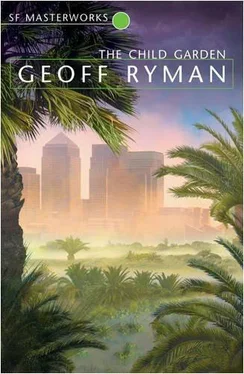‘You could call me Pooh. And I could call you Christopher Robin.’
‘Why?’ said Milena warily.
‘Here, look. That’s Christopher Robin.’
There was a drawing of a small neat person with a page-boy bob and shorts and sandals and loose blouse and a large umbrella. There was no doubt. Milena did indeed look exactly like Christopher Robin.
‘No,’ said Milena.
‘I was going to call you Eeyore,’ said Rolfa. ‘He’s grumpy too.’
‘I’ll tell you what,’ said Milena, ‘If I call you Pooh’ — it really was very unpleasant — ‘do you promise, promise not to call me Christopher Robin?’
Rolfa nodded solemnly, up and down. Her hair still dangled into her eyes. She blinked. She saw Milena looking at the state of the room.
‘Pooh’s very untidy,’ said Rolfa.
‘Yes,’ said Milena nodding.
‘But she does have other qualities.’ Rolfa paused and bit her lip. ‘I’m sorry about the beans.’
‘What about the beans?’
‘I was feeling peckish, and all I could find was some bamboo full of beans, so I tried to warm it up.’
Underneath most of the score for Peer Gynt, Milena found her only saucepan. Light, crispy, burned-black beans were now a permanent part of it.
‘I’ll buy you another one,’ said Rolfa.
‘Good,’ said Milena, wiping the charcoal from the tips of her fingers.
She took a deep breath, to calm herself, and began to explain the house rules. Dirty laundry in this bag here. Clean clothes in this bag. Dirty dishes there. Rolfa nodded in eager agreement. Oh yes, they must always wash up, just after dinner. Why, thought Milena, don’t I believe you?
‘I’m hungry,’ said Rolfa, with tame expectation.
They took a water taxi upstream. The tiny steam engine sputtered, and clouds of vapour rolled upwards in the shape of doughnuts. They went to the Gardens beside the river, where no one would think to look for them, on the other side of Battersea.
There was an old Buddhist shrine there, one of the first built in London. Milena and Rolfa ate lunch beside it, under a marquee. It was crowded and noisy, full of steam and the sizzling sounds of woks. People sat on benches, arguing with infants who kept trying to order different kinds of food. ‘You always order for me!’ the Tykes complained. ‘I can do it myself!’ The infants wanted the food to be bland. ‘No wonder you want everything blasted with pepper, you’ve burned your taste buds out!’ complained one babe in arms. Outside, there were acrobats on the lawn. The babes refused to be distracted.
People walked hand in hand or leaned out over the river, shoulders touching. People live with each other, Milena told herself. Most people live with someone else. She felt a new admiration for the way in which they coped. It must be possible, she thought. There must be a way to do it. Watching other people in couples usually made Milena feel like a bottle with a message in it, washed up and left unread. Now, it began to make her feel a kind of kinship.
‘What do we do now?’ Rolfa asked, as if everything in this new world followed a polished routine.
They walked back along the other side of the river. There were children along the embankment, playing with hoops on moored barges. There was a traffic jam of carts heading back to the outreaches full of goods from the markets to be sold again. Young boys on them leaned back onto melons and played harmonicas. A circle of women sat cross-legged on the pavement, shoving slivers of bamboo into shoes. They were cobblers. A small blonde woman with spectacles and a thimble was talking. ‘Well, my Johnny…’ she began, her voice full of pride.
Rolfa and Milena sat in an old church in John Smith Square and listened to a choir rehearsing madrigals. They went to a market outside Westminster Abbey. Rolfa was hungry again. She bought some dried fish and munched it like candy. She bought a new saucepan and vegetables and bread and more fish. They walked through the August dusk, along Westminster Bridge, past fire-eaters, who blew sheets of flame toward the sky as children watched. Fat men in plaid shorts, Party members perhaps, laughed and passed money. There was to be an ostrich race across the bridge. Jockeys were trying to clamber up onto the backs of the birds. Hoods were snatched from the ostriches’ eyes and they sprang forward. One of them spun in circles and then ran off in the wrong direction. There were cheers. For the first time she could remember, Milena felt young. She and Rolfa walked back to the Shell.
They lit a candle in the room and sorted out Rolfa’s papers. They put pages back in bindings and reunited different halves of musical scores. They worked in silence. They were going to have to share the bed.
It was a small bed and Milena, Rolfa and Piglet were all going to have to fit in it. When the time came, Milena was surprised at how straightforward sleeping with Rolfa was. Rolfa simply took off her clothes and slipped under the counterpane. Without any preliminaries, she began to snore. Milena climbed in next to her with only the slightest trembling in her belly.
Rolfa was hot. Her feet stuck out of the end of the bed to cool. Her snoring was dragon-like, great gurgling snorts, agonised asthmatic wheezes, ruffles of sound like a horse blowing through its loose nostrils. Milena stared at the ceiling in the dark, and felt a trickle of sweat on her forehead.
‘Rolfa. Please?’ she asked.
‘Yum. Um.’ said Rolfa.
Milena reached around and pushed shut her mouth. The snoring stopped and then started again. Milena’s hand brushed Rolfa’s shoulder. It was as warm as a radiator, made piquant by the stubble of whiskers.
Piglet, Milena decided, also smelled of childhood sick.
Finally she slept, as if in a fever, a skittish sleep with dreams. She dreamt that Rolfa rose up all around her and covered her and that they made love. It was a bit like being rubbed by warm sandpaper. Milena could feel the bristles against her cheek and with the tips of her fingers. She awoke in the dark, overjoyed, thinking it had been real, and reached out to find the bed empty and cool.
There was a sizzling sound. Milena looked up and saw a flame. Rolfa was frying something in the light of the single-ring stove. There was a smell of fish.
‘You’ve got fleas,’ said Rolfa, huffily.
‘No I haven’t,’ said Milena, sleepily settling back onto her pillow. It was not possible for human beings to have fleas.
‘I’m being eaten alive!’ exclaimed Rolfa.
Milena was dimly aware of a stirring in the bed. She turned her head. There were mites on the pillow. She sat up and examined them.
‘Oh,’ she said, remembering. ‘Oh. That’s my immune system.’
‘What, trained fleas?’ said Rolfa. When she was angry, Rolfa became something of an aristocrat.
‘No,’ Milena said, mortified and miserable. To have forgotten this only showed so nakedly that she had never been in love. ‘No, we call them Mice. They eat fleas. And bilharzia, and hookworm. They live in our skin. They were engineered for us when the weather got warmer. You’re a foreign body. They think you’re a disease.’
‘Charming,’ said Rolfa.
‘They get used to you. It’s what happens to us. It’s what happens when people become lovers.’
Lovers? Oops. Milena’s eyes popped back open in alarm, and she watched Rolfa, waiting for a reaction. Rolfa went on cooking.
‘But. We’re not lovers, are we?’ said Milena, after a little while.
‘No,’ said Rolfa lightly, and looked at her. ‘I’m making fried bread and sardine sandwiches. Want one?’
‘No thanks,’ whispered Milena. She sat up in bed, and propped her head on arm and looked at Rolfa. It wasn’t going to be like her dream, or like the sickness, either. Living with Rolfa was going to be something calmer and more certain.
Читать дальше












